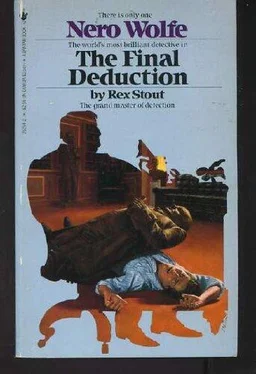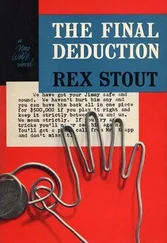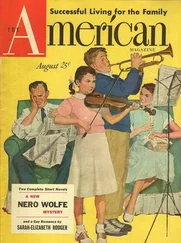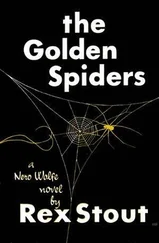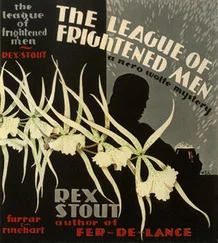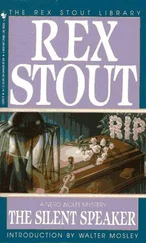Rex Stout - The Final Deduction
Здесь есть возможность читать онлайн «Rex Stout - The Final Deduction» весь текст электронной книги совершенно бесплатно (целиком полную версию без сокращений). В некоторых случаях можно слушать аудио, скачать через торрент в формате fb2 и присутствует краткое содержание. Жанр: Старинная литература, en-GB. Описание произведения, (предисловие) а так же отзывы посетителей доступны на портале библиотеки ЛибКат.
- Название:The Final Deduction
- Автор:
- Жанр:
- Год:неизвестен
- ISBN:нет данных
- Рейтинг книги:5 / 5. Голосов: 1
-
Избранное:Добавить в избранное
- Отзывы:
-
Ваша оценка:
- 100
- 1
- 2
- 3
- 4
- 5
The Final Deduction: краткое содержание, описание и аннотация
Предлагаем к чтению аннотацию, описание, краткое содержание или предисловие (зависит от того, что написал сам автор книги «The Final Deduction»). Если вы не нашли необходимую информацию о книге — напишите в комментариях, мы постараемся отыскать её.
The Final Deduction — читать онлайн бесплатно полную книгу (весь текст) целиком
Ниже представлен текст книги, разбитый по страницам. Система сохранения места последней прочитанной страницы, позволяет с удобством читать онлайн бесплатно книгу «The Final Deduction», без необходимости каждый раз заново искать на чём Вы остановились. Поставьте закладку, и сможете в любой момент перейти на страницу, на которой закончили чтение.
Интервал:
Закладка:
A corner of Wolfe’s mouth was up a little. “Admirable,” he declared. “Competent and admirable.”
Dykes got his notebook out. “She said that?”
“No. I say it. Your demand couldn’t be better organized or better put. Admirable. You have the right to expect a comparable brevity and lucidity from me.” He turned a hand over. “Mr Dykes. I can’t tell you what Miss Utley said to me yesterday without divulging what Mrs Vail has told me in confidence. Of course that wasn’t a privileged communication; I’m not a member of the bar, I’m a detective; and if what Mrs Vail told me is material to your investigation of a murder I withhold it at my peril. The question, is it material, can be answered now only by me; you can’t answer it because you don’t know what she told me. To my present knowledge the answer is no.”
“You’re withholding it?”
“Yes.”
“You refuse to tell me what Dinah Utley said to you yesterday?”
“Yes.”
“Or anything about what she came here for?”
“Yes.”
Dykes stood up. “As you say, at your peril.” He glanced around. “Nice place you’ve got here. Nice to see you again.” He turned and headed for the door. I followed him out and down the hall. As I held his coat for him he said, “At your peril too, Goodwin, huh?” I thanked him for warning me as I gave him his hat, and asked him to give Captain Saunders my love.
When I returned to the office Wolfe had his book open again. Always he is part mule, but sometimes he is all mule. He still didn’t know when or where or how Dinah Utley had died, and he knew I did know, and he had no idea how much or little risk he was running to earn the rest of that sixty grand, but by gum he wasn’t going to budge. He wasn’t going to admit that we cared what had happened to her because he had been childish enough to tell me we didn’t.
At the dinner table, in between bites of deviled grilled lamb kidneys with a sauce he and Fritz had invented, he explained why it was that all you needed to know about any human society was what they ate. If you knew what they ate you could deduce everything else-culture, philosophy, morals, politics, everything. I enjoyed it because the kidneys were tender and tasty and that sauce is one of Fritz’ best, but I wondered how you would make out if you tried to deduce everything about Wolfe by knowing what he had eaten in the past ten years. I decided you would deduce that he was dead.
After dinner I went out. Wednesday was poker night, and that Wednesday Saul Panzer was the host, at his one-man apartment on the top floor of a remodeled house on 38th Street between Lexington and Third. You’ll meet Saul further on. If you’ve already met him you know why I would have liked to have an hour alone with him, to give him the picture and see if he agreed with me about Jimmy Vail. It was just as well I couldn’t have the hour, because if Saul had agreed with me I would have had a personal problem; it would no longer have been just my private guess. Jimmy Vail was responsible for our holding it back until Friday, and if he had killed Dinah Utley he was making monkeys of us. Of course that would serve Wolfe right, but how about me? It affected my poker, with Saul right there, but four other men were there also so I couldn’t tell him. Saul, who misses nothing, saw that I was off my game and made remarks about it. It didn’t affect his game any. He usually wins, and that night he raked it in. When we quit at the usual deadline, two o’clock, he had more than a hundred bucks of my money, and I was in no mood to stay and confide in him as an old and trusted friend.
Thursday, the morning after a late session of hard, tight poker, I don’t turn out until nine or nine-thirty unless something important is cooking, but that Thursday I found myself lying on my back with my eyes wide open before eight. It was getting on my nerves. I said aloud, “Goddam Jimmy Vail anyhow,” swung my legs around, and got erect.
I like to walk. I liked to walk in woods and pastures when I was a kid in Ohio, and now I like to walk even more on Manhattan sidewalks. If you don’t walk much you wouldn’t know, but the angle you get on people and things when you’re walking is absolutely different from the one you get when you’re in a car or in anything else that does the moving for you. So after washing and shaving and dressing and eating breakfast and reading about Dinah Utley in the Times , nothing I didn’t already know, I buzzed the plant rooms on the house phone to tell Wolfe I was going out on a personal errand and would be back by noon, and went.
Of course you don’t learn anything about people in general by walking around taking them in; you only learn things about this one or that one. I learned something that morning about a girl in a gray checked suit who caught her heel in a grating on Second Avenue in the Eighties. No girl I had ever known would have done what she did. Maybe no other girl in the world would. But I shouldn’t have got started about walking. I mentioned walking only to explain how it happened that at a quarter past eleven I entered a drugstore at the corner of 54th Street and Eighth Avenue, sat at the counter, and requested a glass of milk. As it was brought and I took a sip, a Broadway type came in and got on the stool next to me and said to the soda jerk, “Cuppa coffee, Sam. You heard about Jimmy Vail?”
“Where would I hear about Jimmy Vail?” Sam demanded, getting a cup. “All I hear here is step on it. What about Jimmy Vail?”
“He died. It was on the radio just now. Found him dead on the floor with a statue on top of him. You know I used to know Jimmy before he married a billion. Knew him well.”
“I didn’t know.” Sam brought the coffee. “Too bad.” A customer came to a stool down the line, and Sam moved.
I finished the glass of milk before I went to the phone booth. I may have gulped it some, but by God I finished it. I wasn’t arranging my mind; there was nothing in it to arrange; I was just drinking milk. When I went to the phone booth I got out a dime and started my hand to the slot but pulled it back. Not good enough. A voice on a phone is all right up to a point, but I might decide to go beyond that point, and a little more walking might help. I returned the dime to my pocket, departed, walked seven blocks crosstown and ten blocks downtown, entered the marble lobby of a building, and took an elevator.
I gave the receptionist on the twentieth floor a nod and went on by. Lon Cohen’s room, with his name on the door but no title, was two doors this side of the Gazette ’s publisher’s. I don’t remember a time that I have ever entered it and he wasn’t on the phone, and that time was no exception. He darted a glance at me and went on talking, and I took the chair at the end of his desk and noted that he showed no sign of being short on sleep, though he had left Saul’s place the same time I had, a little after two. His little dark face was neat and smooth, and his dark brown, deep-set eyes were clear and keen. When he had finished on the phone he turned to me and shook his head.
“Sorry, I’ve banked it. I guess I could spare a ducat.”
He had been the only winner last night besides Saul. “I wouldn’t want to strap you,” I said. “A dime would see me through the week. But first, what about Jimmy Vail?”
“Oh.” He cocked his head. “Is Wolfe looking for a job, or has he got one?”
Читать дальшеИнтервал:
Закладка:
Похожие книги на «The Final Deduction»
Представляем Вашему вниманию похожие книги на «The Final Deduction» списком для выбора. Мы отобрали схожую по названию и смыслу литературу в надежде предоставить читателям больше вариантов отыскать новые, интересные, ещё непрочитанные произведения.
Обсуждение, отзывы о книге «The Final Deduction» и просто собственные мнения читателей. Оставьте ваши комментарии, напишите, что Вы думаете о произведении, его смысле или главных героях. Укажите что конкретно понравилось, а что нет, и почему Вы так считаете.
